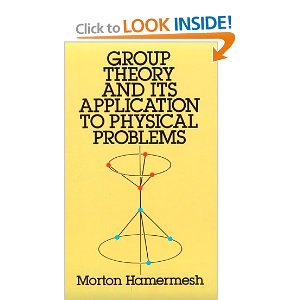Here is my extensively review of various books I had read. For meta discussion, see I have several book reviews. How should I answer in the book request?.
Books being reviewed:
- Wu-Ki Tung, Group theory in physics
- A. Zee, Group Theory in a Nutshell for Physicists
- Jakob Schwichtenberg, Physics from Symmetry
- Sadri Hassani, Mathematical Physics A Modem Introduction to Its Foundations
- Pierre Ramond, Group Theory: A Physicist's Survey
- Sternberg, Group Theory and Physics
Wu-Ki Tung, Group theory in physics
Its approach isn't go from general to specific, but from intuition to generalization. For example, many books explain isomorphism after homomorphism, because the former is a specific case of the latter. But in this book, the order is reversed, because we can imagine isomorphism better than homomorphism.
Together with many connections and discussions between chapters and subsections, it shows that the author has a pedagogical mind. In specific, the book:
- Boldly uses
' for mappings (see def 2.5 for example). I've never seen this kind of notation before, and at first I think using this will make more confusion. But turns out it's not
- Important theorems are named, not just numbered
- Avoids study all groups in detail
- Has many advanced example without proof, because they are just illustrations, not a topic for you to study
- Proofs are deferred after discussing significance
A trivial thing: theorems and definitions have different numbering systems. So when you are told to refer to Def. 1.3, then make sure you are not reading Theorem 1.3.
I highly recommend this book, even though it's quite old (50 years or so).
A. Zee, Group Theory in a Nutshell for Physicists
The book is written in xkcd style: funny and lots of footnotes, with quotes and historic stories. However, most footnotes are at the end of the chapter (endnotes), so when an idea is noted, you can't read it immediately but have to turn to the end of the chapter. This is where the frustration starts: most of the notes are funny comments. Having to break the reading flow and spend more effort just to get a tiny detail or a funny comment is not fun at all. But some of the notes are actually serious and you really don't want to miss it, so every time I see a note I have a mixed feeling.
Here and there there are some insights or unexpected facts (mostly in the introductions and appendices of each chapter), but the rest are verbose and can be reduced, especially when math is involved, so you may want to have good foundation before skipping them. The author explicitly states that he tends to "favor those are not covered in most standard books, such as the group theory behind the expanding universe", and his choices reflect his own likes or dislikes. So if you want to have a standard knowledge in standard book, this is not your choice. The contract of the author with Princeton requires the title to have the bit "in the nutshell", which I think misleading.
Yet, I think you should take a look at the fruitful bits. They do give you new perspectives and insights.
Jakob Schwichtenberg, Physics from Symmetry
Its structure:
- It starts with special relativity,
- then the symmetry tools (Lie group and Lagrange formalism),
- then the basic equations (free and interaction theory),
- then their specific applications: quantum mechanics, quantum field theory, classical mechanics, electrodynamics and gravity.
While the physical meanings of mathematical objects are emphasized, mathematical meanings of mathematical objects are underconsidered. Trace is only a sidenote thing, not the character of equivalent irreducible representations. Schur's lemma is mentioned only in one sentence. The whole representation theory is discussed very fleeting (only one subsection in the Lie group theory section), before going straight to important groups: $SU(2)$, Lorentz group, Poincaré group.
Other books
Here are some books came after I had acquired a good understanding of group theory, so I didn't have much motivation to read them. But I think they are good, and you may want to take a look.
Sadri Hassani, Mathematical Physics A Modem Introduction to Its Foundations
It has side column for notes and summaries; convenient for skimming. At some pages, there are many emboldened characters at a place, quite confusing to read. It also discusses about $Endk$, $Lk$.
Pierre Ramond, Group Theory: A Physicist's Survey
The author gives this analogy at the preface: the universe today is like an ancient pottery, that it isn't as beauty as when it was produced anymore, but we can still feel that beauty.
Explanation of new notation is introduced after its appearance. There is no numbering; the author focuses on making it as fluid as possible.
Sternberg, Group Theory and Physics
So condensed. I can't get through it. Not recommended.
During my study, I read and take notes on tablet. Most of the books are scanned. If you feel frustrated because the pages are not well split, or the PDF does not contain a table of content, or not having enough margin to take note, you can read this article: The ultimate guide to process scanned books.

